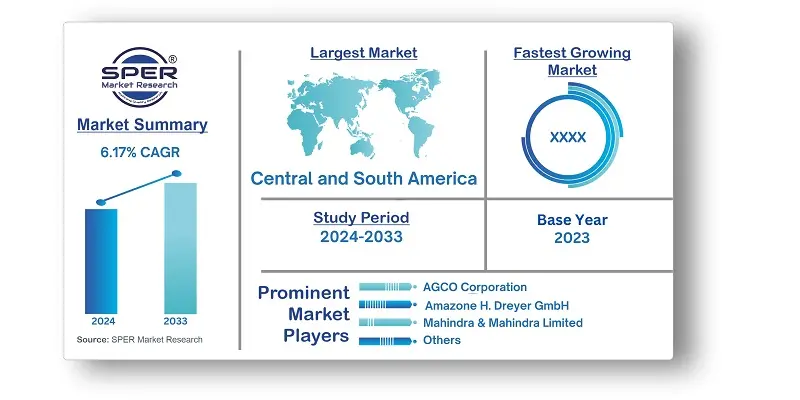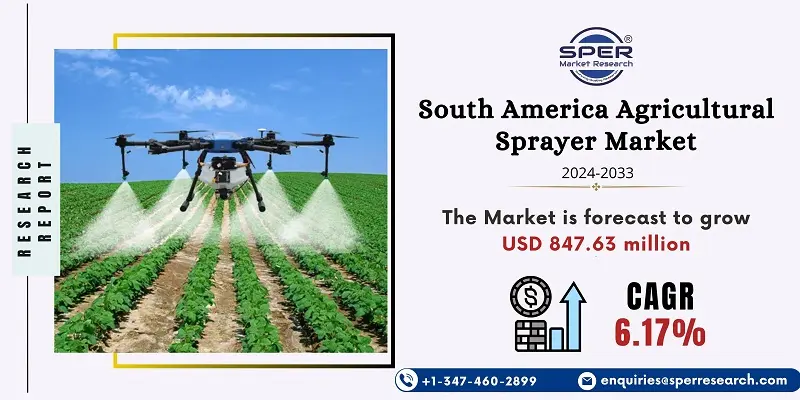
South America Agricultural Sprayer Market Trends, Share, Demand, Revenue and Future Outlook
South America Agricultural Sprayer Market Growth, Size, Trends Analysis- By Source of Power, By Usage, By Mode of Capacity- Regional Outlook, Competitive Strategies and Segment Forecast to 2033
| Published: Nov-2024 | Report ID: AGRI2449 | Pages: 1 - 158 | Formats*: |
| Category : Agriculture | |||
- September 2022; John Deere combined targeted spray technology with a traditional broadcast system to introduce their "see and spray" technology on a new sprayer.
- June 2022; In order to develop a series of smart sprayers, Bosch BASF Smart Farming GmbH partnered with Stara in commercial sales.


| Report Metric | Details |
| Market size available for years | 2020-2033 |
| Base year considered | 2023 |
| Forecast period | 2024-2033 |
| Segments covered | By Source of Power, By Usage, By Mode of Capacity |
| Regions covered | South America, Brazil, Argentina, Rest of South America |
| Companies Covered | AGCO Corporation, Amazone H. Dreyer GmbH, John Deere, Kubota Corporation, Mahindra & Mahindra Limited, Nichino America, Inc., Samsun Agricultural Machinery, and STIHL Group. |
- Farmers
- Agricultural cooperatives
- Agronomists
- Crop protection companies
- Government agricultural departments
- Agricultural equipment distributors
- Agricultural service providers
| By Source of Power: | |
| By Usage: | |
| By Mode of Capacity: |
- South America Agricultural Sprayer Market Size (FY’2024-FY’2033)
- Overview of South America Agricultural Sprayer Market
- Segmentation of South America Agricultural Sprayer Market By Source of Power (Manual, Battery-operated, Solar Sprayers, Fuel-operated, Others)
- Segmentation of South America Agricultural Sprayer Market By Usage (Field Sprayers, Orchard Sprayers, Gardening Sprayers)
- Segmentation of South America Agricultural Sprayer Market By Mode of Capacity (Ultra Low Volume, Low Volume, High Volume)
- Statistical Snap of South America Agricultural Sprayer Market
- Expansion Analysis of South America Agricultural Sprayer Market
- Problems and Obstacles in South America Agricultural Sprayer Market
- Competitive Landscape in the South America Agricultural Sprayer Market
- Impact of COVID-19 and Demonetization on South America Agricultural Sprayer Market
- Details on Current Investment in South America Agricultural Sprayer Market
- Competitive Analysis of South America Agricultural Sprayer Market
- Prominent Players in the South America Agricultural Sprayer Market
- SWOT Analysis of South America Agricultural Sprayer Market
- South America Agricultural Sprayer Market Future Outlook and Projections (FY’2024-FY’2033)
- Recommendations from Analyst
1.1. Scope of the report1.2. Market segment analysis
2.1. Research data source2.1.1. Secondary Data2.1.2. Primary Data2.1.3. SPER’s internal database2.1.4. Premium insight from KOL’s2.2. Market size estimation2.2.1. Top-down and Bottom-up approach2.3. Data triangulation
4.1. Driver, Restraint, Opportunity and Challenges analysis4.1.1. Drivers4.1.2. Restraints4.1.3. Opportunities4.1.4. Challenges4.2. COVID-19 Impacts of the South America Agricultural Sprayer Market.
5.1. SWOT Analysis5.1.1. Strengths5.1.2. Weaknesses5.1.3. Opportunities5.1.4. Threats5.2. PESTEL Analysis5.2.1. Political Landscape5.2.2. Economic Landscape5.2.3. Social Landscape5.2.4. Technological Landscape5.2.5. Environmental Landscape5.2.6. Legal Landscape5.3. PORTER’s Five Forces5.3.1. Bargaining power of suppliers5.3.2. Bargaining power of buyers5.3.3. Threat of Substitute5.3.4. Threat of new entrant5.3.5. Competitive rivalry5.4. Heat Map Analysis
6.1. South America Agricultural Sprayer Market Manufacturing Base Distribution, Sales Area, Product Type6.2. Mergers & Acquisitions, Partnerships, Product Launch, and Collaboration in South America Agricultural Sprayer Market
7.1. South America Agricultural Sprayer Market Size, Share and Forecast, By Source of Power, 2020-20267.2. South America Agricultural Sprayer Market Size, Share and Forecast, By Source of Power, 2027-20337.3. Manual7.4. Battery-operated7.5. Solar Sprayers7.6. Fuel-operated7.7. Others
8.1. South America Agricultural Sprayer Market Size, Share and Forecast, By Usage, 2020-20268.2. South America Agricultural Sprayer Market Size, Share and Forecast, By Usage, 2027-20338.3. Field Sprayers8.4. Orchard Sprayers8.5. Gardening Sprayers
9.1. South America Agricultural Sprayer Market Size, Share and Forecast, By Mode of Capacity, 2020-20269.2. South America Agricultural Sprayer Market Size, Share and Forecast, By Mode of Capacity, 2027-20339.3. Ultra Low Volume9.4. Low Volume9.5. High Volume
10.1. South America Agricultural Sprayer Market Size and Market Share
11.1. South America Agricultural Sprayer Market Size and Market Share By Region (2020-2026)11.2. South America Agricultural Sprayer Market Size and Market Share By Region (2027-2033)11.3. South America11.3.1. Brazil11.3.2. Argentina11.3.3. Rest of South America
12.1. AGCO Corporation12.1.1. Company details12.1.2. Financial outlook12.1.3. Product summary12.1.4. Recent developments12.2. Amazone GmbH12.2.1. Company details12.2.2. Financial outlook12.2.3. Product summary12.2.4. Recent developments12.3. Case IH12.3.1. Company details12.3.2. Financial outlook12.3.3. Product summary12.3.4. Recent developments12.4. CNH Industrial12.4.1. Company details12.4.2. Financial outlook12.4.3. Product summary12.4.4. Recent developments12.5. Jacto12.5.1. Company details12.5.2. Financial outlook12.5.3. Product summary12.5.4. Recent developments12.6. John Deere12.6.1. Company details12.6.2. Financial outlook12.6.3. Product summary12.6.4. Recent developments12.7. Kubota Corporation12.7.1. Company details12.7.2. Financial outlook12.7.3. Product summary12.7.4. Recent developments12.8. HORSCH Maschinen GmbH12.8.1. Company details12.8.2. Financial outlook12.8.3. Product summary12.8.4. Recent developments12.9. Sima Pro12.9.1. Company details12.9.2. Financial outlook12.9.3. Product summary12.9.4. Recent developments12.10. Others
SPER Market Research’s methodology uses great emphasis on primary research to ensure that the market intelligence insights are up to date, reliable and accurate. Primary interviews are done with players involved in each phase of a supply chain to analyze the market forecasting. The secondary research method is used to help you fully understand how the future markets and the spending patterns look likes.
The report is based on in-depth qualitative and quantitative analysis of the Product Market. The quantitative analysis involves the application of various projection and sampling techniques. The qualitative analysis involves primary interviews, surveys, and vendor briefings. The data gathered as a result of these processes are validated through experts opinion. Our research methodology entails an ideal mixture of primary and secondary initiatives.



Frequently Asked Questions About This Report
PLACE AN ORDER
Year End Discount
Sample Report
Pre-Purchase Inquiry
NEED CUSTOMIZATION?
Request CustomizationCALL OR EMAIL US
100% Secure Payment






Related Reports
Our Global Clients
Our data-driven insights have influenced the strategy of 200+ reputed companies across the globe.






















